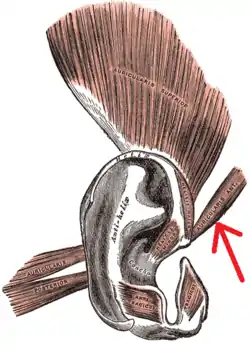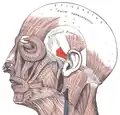Anterior auricular muscle
The anterior auricular muscle, the smallest of the three auricular muscles, is thin and fan-shaped, and its fibers are pale and indistinct. It arises from the lateral edge of the epicranial aponeurosis, and its fibers converge to be inserted into a projection on the front of the helix.
| Anterior auricular muscle | |
|---|---|
 Face and neck muscles. Anterior auricular muscle shown in red. | |
 The muscles of the auricula. Anterior auricular is at right (indicated by the red arrow). | |
| Details | |
| Origin | temporal fascia |
| Insertion | major helix (ear) |
| Artery | posterior auricular artery |
| Nerve | temporal branch of facial nerve |
| Actions | pulls ear forward |
| Identifiers | |
| Latin | Musculus auricularis anterior |
| TA98 | A04.1.03.020 |
| TA2 | 2089 |
| FMA | 46856 |
| Anatomical terms of muscle | |
Structure
The anterior auricular muscle arises from the lateral edge of the epicranial aponeurosis.[1] It inserts into a projection on the front of the helix.[1]
Nerve supply
The anterior auricular muscle is supplied is supplied by the temporal branch of the facial nerve (VII).[2][3] It may also receive some small branches from the auriculotemporal nerve, a branch of the mandibular nerve, itself a branch of the trigeminal nerve (V).[4]
Relations
The anterior auricular muscle is the smallest of the three auricular muscles.[1]
The superficial temporal artery, a branch of the external carotid artery, travels underneath the anterior auricular muscle to supply the auricle of the outer ear.[1]
Function
The anterior auricular muscle draws the auricle of the outer ear upwards and forwards.[1] This is a very subtle movement in most people, although some people can wiggle their ears.[1]
Additional images
 Auricula in context.
Auricula in context.
References
![]() This article incorporates text in the public domain from page 1035 of the 20th edition of Gray's Anatomy (1918)
This article incorporates text in the public domain from page 1035 of the 20th edition of Gray's Anatomy (1918)
- Niamtu, Joseph (2018). "8 - Cosmetic Otoplasty and Related Ear Surgery". Cosmetic Facial Surgery (2nd ed.). Edinburgh: Elsevier. pp. 473–532. doi:10.1016/B978-0-323-39393-5.00008-X. ISBN 978-0-323-39402-4. OCLC 976037123.
- Barral, Jean Pierre; Croibier, Alain (2009). "19 - Facial nerve". Manual therapy for the cranial nerves. Edinburgh: Churchill Livingstone / Elsevier. pp. 153–166. doi:10.1016/B978-0-7020-3100-7.50022-7. ISBN 978-0-7020-3736-8. OCLC 460904284.
- Rea, Paul (2016). "2 - Head". Essential clinically applied anatomy of the peripheral nervous system in the head and neck. Amsterdam: Academic Press, Elsevier Science. pp. 21–130. doi:10.1016/B978-0-12-803633-4.00002-8. ISBN 0-12-803664-8. OCLC 939866688.
- Barral, Jean-Pierre; Croibier, Alain (2009). "25 - Ear". Manual Therapy for the Cranial Nerves. Edinburgh: Churchill Livingstone / Elsevier. pp. 227–238. doi:10.1016/B978-0-7020-3100-7.50028-8. ISBN 978-0-7020-3736-8. OCLC 460904284.